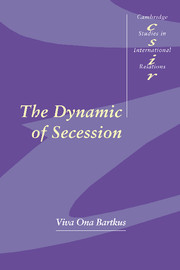Book contents
- Frontmatter
- Contents
- Acknowledgments
- I Introduction
- II The costs and benefits
- III The dynamic of secession
- 7 “Last resorts”: a rise in the costs of membership
- 8 “Opportune moments”: a reduction in the costs of secession
- 9 A reduction in the benefits of membership
- 10 A rise in the benefits of secession
- 11 Conclusion
- Bibliography
- Index
- CAMBRIDGE STUDIES IN INTERNATIONAL RELATIONS
8 - “Opportune moments”: a reduction in the costs of secession
Published online by Cambridge University Press: 22 September 2009
- Frontmatter
- Contents
- Acknowledgments
- I Introduction
- II The costs and benefits
- III The dynamic of secession
- 7 “Last resorts”: a rise in the costs of membership
- 8 “Opportune moments”: a reduction in the costs of secession
- 9 A reduction in the benefits of membership
- 10 A rise in the benefits of secession
- 11 Conclusion
- Bibliography
- Index
- CAMBRIDGE STUDIES IN INTERNATIONAL RELATIONS
Summary
Despite numerous restraints on secession, secessionist struggles continue to ravage many countries around the world. The purpose of this chapter is to trace how a reduction in the costs of secession affects the secession dynamic. More specifically, the discontented community is more likely to attempt secession when the perceived likelihood of success has been enhanced;in other words, at an “opportune moment.” State opposition and international hostility toward secessions constitute these costs. Although there has not necessarily been a noticeable decrease in international hostility toward secessions in general, effective state opposition in specific cases can be reduced in two ways. Domestically disruptive circumstances such as war, or social upheaval, can curtail the government's effective authority over its territory. External intervention in support of a discontented community can also impede government efforts to suppress a secessionist movement. On our allegorical scales, a secession crisis would arise because the distinct community has experienced a marked reduction of this particular cost.
The weakening of the central government or foreign intervention on behalf of the distinct community have historically provided just such opportune moments for secession attempts. One stark example of how the central government's collapse can precipitate secession crises lies in the Russian revolution. Numerous peripheral communities took advantage of this opportune moment to secede from tsarist Russia. The new Bolshevik government was confronted with a deluge of secessionist activity by at least fifteen distinct communities.
- Type
- Chapter
- Information
- The Dynamic of Secession , pp. 145 - 166Publisher: Cambridge University PressPrint publication year: 1999



